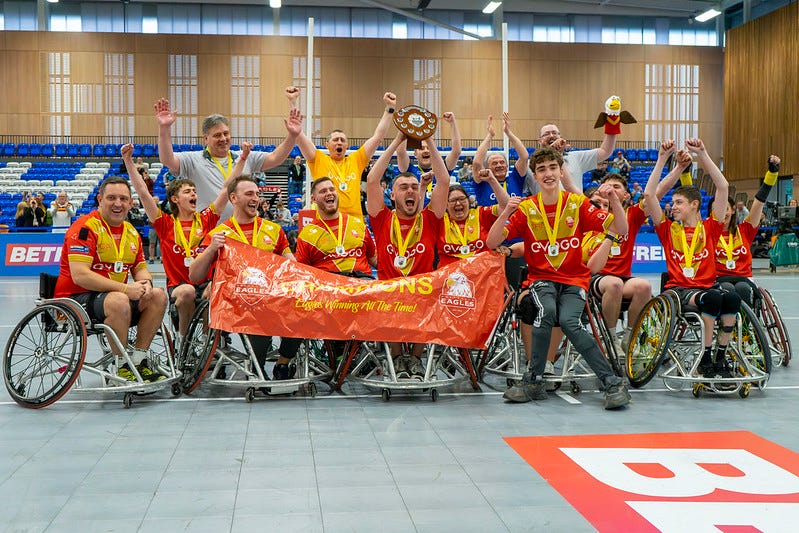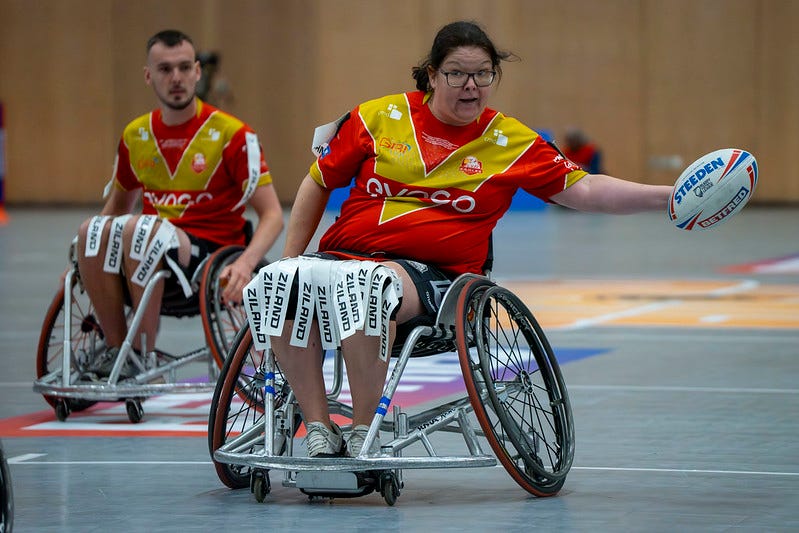Coaching Wheelchair Rugby League
Bringing inclusivity, performance and belonging together within wheelchair rugby league, Coach Greg Brown shares his approach to the sport including winning last year's Grand Final
I’m the head coach of Sheffield Eagles Wheelchair Rugby League team and I’m also a development coach for the England RL wheelchair program focusing on women and juniors.
The pathway for wheelchair rugby league is growing all the time. Since the World Cup that was held here in 2022, interest in the sport has sky rocketed. (When do you get to say England won a World Cup right?)
Now that I’ve had the opportunity to see it from within, it’s not a surprise that the wheelchair game is English rugby league’s best performing area. There are some great people involved in the sport.
Wheelchair Rugby League is by definition inclusive rather than a disability sport. That sounds like I’m playing with words, but there is a big difference between the two.
I recently spent a weekend with Wheelchair Rugby, another great disability sport, but the Paralympic connection means that classification limits the number of people who can play at the highest level.
Wheelchair rugby league doesn’t do that and there are opportunities for able-bodied people to play alongside disabled players in international competition, which makes it pretty unique.
As a consequence, there are a lot of family stories in wheelchair rugby league. For example, at Sheffield we have the Brooks family. They came to wheelchair rugby league in the first place as Mum played rugby league for Sheffield in the past.
Her son has a disability, so the sport was a perfect match for him and Mum was able to play alongside too.
His sister wasn’t for being left out and now they all play together.
They are all part of the England junior and women’s pathway now as well. They have been one of the club’s real success stories who we are really proud of.
Last season, we won the grand final and I was tremendously proud of everyone involved. We didn’t win a game in our first season, we always prioritised participation in the team over winning particularly in that first season.
I remember having to stand up in front of the club at our presentation evening after our first season saying don’t worry, we’ll be winning games soon. Apparently not many people believed me. So it made things even more satisfying for all involved.
For our preparation for the final, I tried very hard to keep the message simple, we went into the game with three core concepts. It was then up to the players to find a way to make those happen.
The key message really was continue to be yourself and don’t change anything just because it is a final. Being the player you are and the team you are got you to the grand final so it can also win you one too.
Ahead of our first season in the Super League, we got together early and set out of few key ideas for the season going forward.
It’s important to note that the group is not just the Super League team. The majority of our players won’t play in that team this season, but in the other games and competitions we enter.
It’s an interesting line to tread between having performance and participation but for now we are managing it.
One of the real strengths of the group is the way the entire group connects with one another. From the players in the England team, through to the players who are joining for the first time.
It’s been a key part of the culture at Eagles that everybody connects so well. If you were to ask for the ingredient of the secret sauce that’s made the Eagles group a success, this is probably it.
I’d love to take credit for that but I honestly put it down to the really great people who have come to play in the wheelchair team and their willingness to give to the others in the team.
This year, we have a round robin with the six Superleague teams, at this point the top four will move into a finals series. There’s also the wheelchair version of the famous Challenge Trophy, which we are entered into for the first time this season which is also really exciting.
The Development of Women’s Wheelchair Rugby League
I’m also involved in the England women’s set up. I was fortunate enough to be a part of the inaugural women’s days and the development of an England women’s wheelchair RL programme.
In Sheffield, we’ve had a larger number of female players than is typical for a club, so we’re able to lead the way a little bit with this initiative.
The first full women’s training day was held in Sheffield and was really successful so we did it again.
It’s also very topical. The sport has resisted having a women-only team and there are some women who don’t approve of us going down this route, something which I completely understand.
Wheelchair rugby league is inclusive, so men and women play together regularly on the same teams. So the idea of splitting into a men’s and women’s competition is not seen as something compatible with the ethos of the sport.
If we are going to go down the route of giving the women in the game an additional opportunity, we have to make a conscious effort to ensure that it stays that way and doesn’t become exclusionary.
There was clearly a different dynamic within the women-only set up which was really cohesive and supportive. I’m really looking forward to seeing how a particular style of women’s play starts to develop.
The NRLW (National Women’s Rugby League) uses the slogan “Same Game Our Way”. I really like that, and it reflects what is happening with the women’s game in wheelchair as well.
Some of the nicest feedback I had afterwards was: “it felt like a place where I could be myself”. That’s the sort of environment that I always aspire to no matter what group I’m coaching so I was super thrilled to hear that.
The Senior England team remains an open and inclusive team by definition and we hope that never changes. A position echoed by the women who have participated so far. This is “as well” rather than “instead”.
The issue now though is the England squad is currently the only active women’s group in the sport that we are aware of.
There are discussions with France to create a women’s team for the first women’s wheelchair rugby league test match at the end of 2025.
Australia probably won’t be far away either but that’s a completely different set of logistics to deal with.
The Sound and Feel of Training Sessions
The training session format can vary dramatically dependent on who is at training. Creating sessions that can be both enjoyable and challenging across a wide range of playing abilities or disability brings its challenges.
We also have a relatively small amount of training time to utilise. Everybody has really different needs, so I rely on a lot of small sided games that again looks a lot like a training that you might see in the running game.
The game is practically the same as running rugby league but in a chair, so apart from additional elements that are specific to using a chair, the rugby is really the same.
There’s a lot of loud metal on metal contacts between the chairs. There’s also a lot of laughter and a lot of chatter, both on and off the field.
Running into each other at full speed in a rugby league wheelchair is tremendous fun. The only way I’ve been able to describe it is if you’ve been to the dodgems and you’ve lined your friend up and absolutely smashed into them, it’s that sort of fun. Just 70 times in 80 minutes!
Wheelchair rugby league is genuinely good fun so there’s a lot of laughter and communication.
Players are genuinely very supportive of each other, which is what I like about coaching this sport.
Attending the Inter-Spinal Games
The Spinal Games is made up of people who have recently become disabled and are starting their new lives in a wheelchair. The Inter-Spinal games give people to opportunity to meet people in a similar situation.
It creates a sense of community, whilst giving people the opportunity to try out a load of different sports all within a few days to find out what they like doing and/or what they might be good at.
It was really interesting to hear people’s stories and learn about their experiences as well as watch them really find joy in new sports at a time which is no doubt pretty tough.
Coaching Philosophy
“Don’t tell me what you can’t do tell me what you can do”
It’s very much a strengths-based approach. Do the things that you are good at and its them up to me to build a team structure to maximise your strengths. My slightly made up example is somebody might come and tell me you know my left arm doesn’t work too well – my response is what does your right arm do then? Then we take it from there.
I honestly feel my role as a coach is mostly to keep out of a player’s way and let them be themselves. So, I’m not very prescriptive which, if you are somebody who has had very directive coaches in the past probably takes some getting used to but I hope what happens is players find the space they need to discover what they are capable of.
If you’re unable to sign up for regular paid subscription, you can still buy me a coffee.




